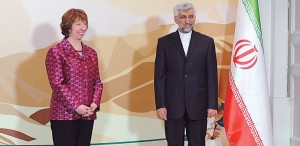 AFP -�Talks between world powers and Iran to find a solution to end tensions over the Iranian nuclear drive have once again hit an impasse, even if the diplomatic process is not yet seen to be at risk of collapsing.
AFP -�Talks between world powers and Iran to find a solution to end tensions over the Iranian nuclear drive have once again hit an impasse, even if the diplomatic process is not yet seen to be at risk of collapsing.Negotiators from world powers came to the snow-peaked city of Almaty for the latest round of talks with cautious optimism that they could make some progress following an encouraging February meeting at the same venue.
But the talks ended with both sides -- according to EU foreign policy chief Catherine Ashton -- "far apart" amid dogged insistence from Iran that its nuclear "rights" be recognised.
The sticking point was the contents of a package from the world powers that proposes easing some sanctions against the Islamic republic in exchange for Tehran curbing its uranium enrichment activities.
But Western officials complained that Iran had failed in these talks to give "a concrete, comprehensive and complete response" to the offer on the table despite earlier statements of good will.
"There is a tremendous lack of trust -- distrust -- on both sides," a senior US official said on condition of not being identified.
"It is fair to say that Iran is willing to take very limited steps on its nuclear programme while expecting very significant results in return," the official added.
US Secretary of State John Kerry, on a visit to Turkey on Sunday, warned: "This is not an endless process.... You can't just talk for the sake of talking."
The intransigent mood for the Almaty talks was set when chief Iranian negotiator Saeed Jalili -- a hardliner close to supreme leader Ayatollah Ali Khamenei -- demanded immediate recognition of Iran's "right" to enrich uranium.
The world powers -- comprised of the five permanent UN Security Council members and Germany and known collectively as the P5+1 -- suspect Iran harbours ambitions to build an atomic bomb under the guise of its civilian nuclear energy programme.
That view has been supported by Iran's refusal to fully cooperate with UN nuclear inspectors and its failure to disclose in a timely manner the existence of a mountain bunker called Fordo that enriches uranium to high levels just a few technical steps from weapons-grade material.
Iran's top foe Israel meanwhile watches the inconclusive process with impatience and has not ruled out air strikes against Fordo and other sites should the negotiations drag on.
The United States has maintained that it, too, is keeping the option of military action open if all else fails.
With stakes so high, neither the P5+1 nor Iran want the negotiations to collapse.
But Iran's negotiating position is complicated by presidential elections in June in which Iranian President Mahmoud Ahmadinejad must step down after the maximum two terms.
While it is Khamenei who sets Iran's line in the nuclear talks, the elections are bolstering rigidity on the issue from loyalist officials vying to succeed Ahmadinejad.
Ashton said that, despite her disappointment, she would call Jalili within days to find a way to move beyond Almaty and agree on a new meeting.
"The important thing is that the negotiations have not fallen through, there is no apparent acrimony, and the process will probably survive until Iran's presidential election," said Shashank Joshi, an analyst with the London-based Royal United Services Institute.
"Both sides are eager to keep the overall diplomatic process alive," he said.
Western officials said some aspects of the latest talks were encouraging because there was genuine discussion instead of just a reading out of rehearsed "set piece" positions as in the past.
"But you still have to get to the substance. The substance is not there yet," said the US official.
Another motivation for world powers is the standoff on North Korea -- an isolated, nuclear-armed country allied to Iran whose bellicose threats have alarmed its neighbour South Korea and the United States in the last few days.
"The P5+1 will be even more mindful of the need to resolve the Iranian nuclear crisis before it gets to the stage of North Korea and possessing a nuclear weapon, which would make the situation in Iran ever so much more complicated and dangerous," said Mark Fitzpatrick of the London-based International Institute for Strategic Studies.
By France 24
The Iran Project is not responsible for the content of quoted articles.










